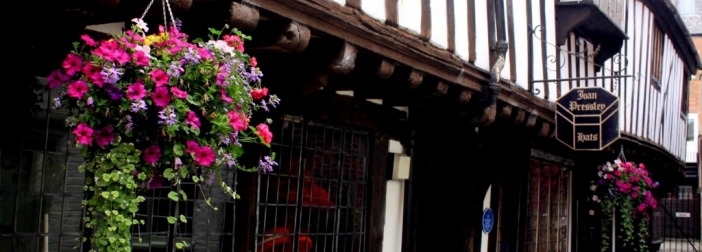Wiltshire County Asylum for Insane - Roundway Hospital
Its construction was approved in 1848. Dr Thurnham, a well respected and liberally advanced psychiatrist from York, was appointed as its first medical superintendent in 1849. He oversaw its design and construction. The building was designed by T. H. Wyatt in the Italian style and cost £19,594, with a further £1,069 for ironwork. Building started in the summer of 1849 with stone from Murhill quarries, near Winsley and slates from Wales; both materials being transported on the Kennet and Avon Canal which had opened in 1810.
There is a photogallery of the Wiltshire County Asylum - Roundway Hospital here
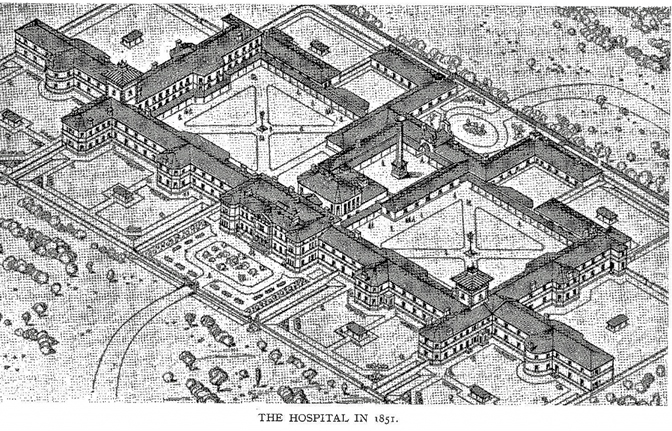
Above is the hospital in 1851.
Below left the entrance to the County asylum ca 1900. Below right West front ca 1905
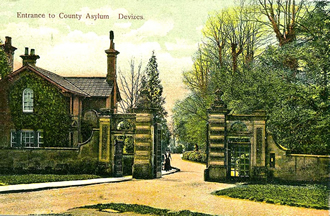
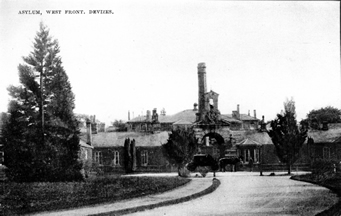
The first patients were admitted to the The Wiltshire County Lunatic Asylum, later Roundway Hospital, on 19th September 1851. It was for pauper lunatics too. Owing to a disinclination on the part of the county authorities to spend too much money the asylum was too small from the time it was built, and there were extensions and new buildings in just about every decade except the 1940s. There were 350 patients by 1860, 449 by 1870 and 976 in 1910. John Thurman, who was also a noted local archaeologist, died in 1873. He had set the pattern for compassionate care and also recognised that many people sent by parish authorities were not insane but had other problems.
At first it could take 250 patients, although it was too small from the start and there were new buildings and extensions in nearly every decade, apart for the 1940s.
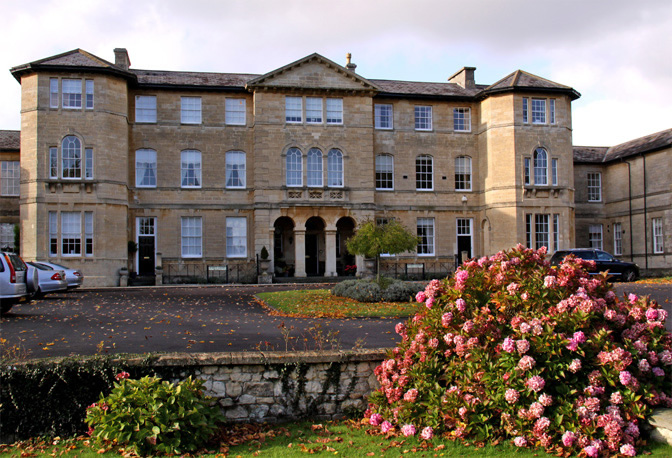
Above the East Front in 2009 showing the elegant talianate signed by TH Wyatt
Medical Superintendent | Time |
Main events
|
Dr John Thurnham | 1849 to 1873 (died) | Design, building and opening in 1851. New female ward in 1858. 1863-66 3 more wards added |
Dr James Wilkie Burman | 1873 to 1878 (resigns) | 2 more wards in 1877 |
Dr Edward Marriot Cooke | 1878 to 1881 (moves to Worcestershire Asylum) |
|
Dr John Ireland Bowes | 1881 to 1913 (retires) | 1889 Wiltshire take over management 1890 3rd storey for main building 1892 Campfield House built for Superintendent. 1898 Recreation Hall and Engine room added to change from gas to electric |
Dr. Sydney Coles (from Deputy) | 1913 to 1934 (retires) | 1914 90 evacuees from Bristol in war . 1915-16 TB and dysentery death rate doubles. 1917 200 evacuees from Portsmouth. 1919 evacuees returned. 1920 High levels of TB and dysentery continue, negative inspectors reports. 1922 name changed to Wiltshire County Mental Hospital. 1927 nurses homes built. 1928 Occupational therapy begins, 19302 social workers appointed. |
Dr. John Leech (from Deputy) | 1934 to 1947 (retires) | 1935 major building programme to increase capacity and improve sanitation. 1937 Chapel completed. 1938 malarial drugs and drug induced convulsive therapy introduced.1942 Electro-convulsive therapy introduced. 1946 pre-frontal leucotomy introduced. |
Dr. Millar Speer | 1947 to 1957 (retires) | Insulin coma therapy introduced. 1956 to 1959 major tranquilising drugs and anti-depressant drugs introduced |
Dr JB Gordon-Russell | 1957 to 1964 | Industrial therapy started 57 patients in outside employment. 1961 government policy to close mental hospitals announced. After 1964 the post of medical superintendent is abolished. There were separate administrative and medical management structures. |
Year | Total Patients | Male Numbers |
Female numbers
|
1860 | 350 | 141 | 209 |
1870 | 449 | 195 | 254 |
1880 | 587 | 263 | 324 |
1890 | 674 | 315 | 359 |
1900 | 916 | 400 | 516 |
1910 | 976 | 440 | 536 |
1920 | 919 | 401 | 518 |
1930 | 1144 | 516 | 628 |
1940 | 1411 | 609 | 802 |
1943 | 1510 |
|
|
1950 | 1321 | 535 | 786 |
1960 | 1142 |
|
|
1970 | 886 |
|
|
1980 | 585 |
|
|
1990 | 270 |
|
|
The hospital was closed in 1995 and a new Green Lane Mental Hospital was built on Green Lane; it is managed by the Avon and WiltshireTrust.
The grade 2 listed buildings of the old Hospital have been beautifully converted to modern apartments which are are on the private market. The owners have the advantage of high ceiling accomodation set in beautiful parkland. Nearby Drews Pond Wood Nature reserve is nearby and this incorporates the former burial ground and some of the estate.

